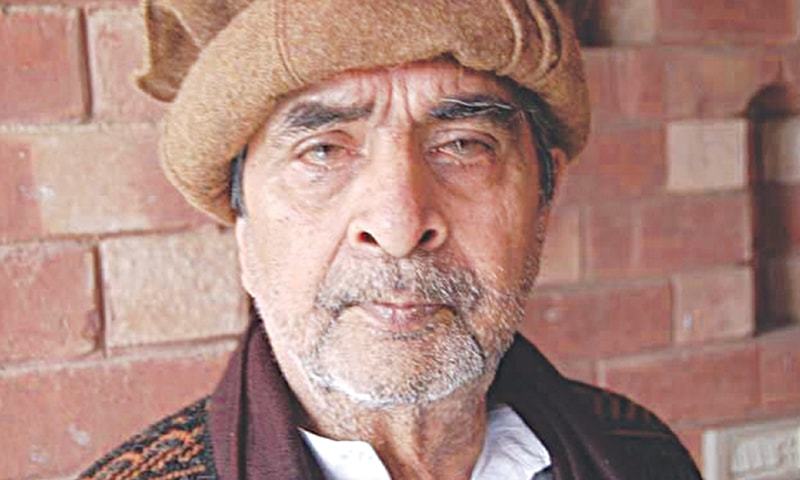Professor Jamaluddin Naqvi, political worker, author and one of the pioneers of left-wing politics in Pakistan, passed away in Karachi on Thursday. He was 85.
The political life of Jamal Naqvi, as he is also known, remains something of an enigma, though it spanned over 40 years. He worked as an underground activist of the then-outlawed Communist Party of Pakistan (CPP). He was repeatedly arrested, tortured, tried by a military court, and incarcerated for years. Yet Prof Naqvi remained committed to the Marxist movement. It was only in later years that he became disillusioned.
Born in Allahabad in 1933, Prof Naqvi belonged to a highly educated family; his three siblings attained doctorate and post-graduate degrees, while he became a professor of English. He was attracted to the Marxist movement during his college days, and continued to be part of it after migrating to Pakistan in 1950.
Jamal Naqvi lost his father at an early age and his mother decided to migrate to Pakistan. They settled in PIB Colony, Karachi, and the young Jamal took admission in Islamia College. Famous critic Prof Hasan Askari and poet Mustafa Zaidi were both teachers there.
That was a time when there were not enough educational institutions to accommodate the growing number of students. This led to the emergence of a left-oriented student body, launched by Dr Sarwar, Dr Mir Rehman Ali Hashmi, Dr Adeebul Hasan Rizvi, Dr Haroon and Mirza Muhammad Kazim. Many students were injured when police opened fire on students, and Jamal Naqvi and others were detained for some time. Later, prime minister Khawaja Nazimuddin met a delegation of the Democratic Students Federation (DSF) and accepted its demands. This made Karachi University active; new colleges were established, and fees were reduced, as well as bus fares for students.
On Jan 8, 1954, the DSF organised a convention at Katrak Hall that was attended by students from all over the country. Pro-government workers tried to disrupt it, yet it helped establish an organisation called the All Pakistan Students Organisation (APSO). Jamal Naqvi played an active role.
During the ’50s, Pakistan had started moving towards the orbit of Cold War; One Unit was created and the CPP and its affiliated wings were banned. Prof Naqvi, along with other pioneering left-wing activists, was arrested and sent to Karachi Jail. A young lawyer, Fakhruddin G. Ebrahim, went there and communist leader Hasan Nasir requested him to plead their case. Mr Ebrahim agreed, and that is how he established his life-long link with progressive forces.
During the late 1950s, Prof Naqvi, on the instructions of the CPP, joined the National Awami Party (NAP), which at the time was headed by Maulana Bhashani. He also remained in charge of the Communist Party of Sindh and coordinator of the Communist Party of East Pakistan, travelling to Dhaka as many as 40 times. After divisions developed in communist ranks, the CPP and the NAP parted ways. Prof Naqvi joined the pro-Soviet faction of the CPP, and remained associated with the NAP group headed by Wali Khan. In 1968, he was made a member of the CPP’s central committee, and later of the politburo.
During the first government of the PPP under Zulfikar Ali Bhutto, when the NAP government was dismissed in Balochistan and its central leaders arrested, the CPP started to campaign against the federal government. At one stage Prof Naqvi was arrested on charges of cattle theft and remained in jail for eight months.
During the Zia era, the CPP adopted a policy of resistance. In 1978, a central leader of the party, Jam Saqi, was arrested and secretary-general Imam Ali Nazish moved to Afghanistan. Prof Naqvi and student leader Nazir Abbasi were left mainly in charge of running the affairs of the underground party. They ensured the publication of party organs Surkh Parcham in Urdu and Halchal in Sindhi.
Two years later, military intelligence raided CPP hideouts, arresting Prof Naqvi, Nazir Abbasi and Sohail Sangi amongst others. The torture resulted in the death of Nazir Abbasi. Dr Jabbar Khattak, Amar Lal and Jam Saqi were booked in fabricated cases. Prof Naqvi spent 16 months in solitary confinement, and all later were part of a famous military court trial in Karachi, known as the Jam Saqi case.
In 1981, when a PIA aircraft was hijacked and Al-Zulfiqar militants demanded a swap of hostages for jailed political activists, Prof Naqvi and his comrades refused to leave the jail and the country.
While in prison, Prof Naqvi suffered paralysis and had to be admitted to hospital. The Sindh High Court released him on bail on March 23, 1988. Benazir Bhutto reinstated him at his job.
Prof Naqvi published his first book in 1986, titled Inside Pakistan. His second book came out in 2006, titled Partition and Convergence: South Asia in the 21st Century. Finally, in 2014, there was Leaving the Left Behind, in which he declared the Soviet Union a wrong-headed experiment and socialism as impractical, with democracy as the only right path.
He leaves behind his wife, Kazmi Khatoon, a son and two daughters, of whom Afshan Subohi is associated with Dawn as an assistant editor.
Prof Naqvi’s funeral prayers were offered at Jamia Masjid Gulzar-i-Mustafa near Lilly Bridge, Clifton. He was laid to rest at the Gizri graveyard.
Published in Dawn, August 4th, 2017














































